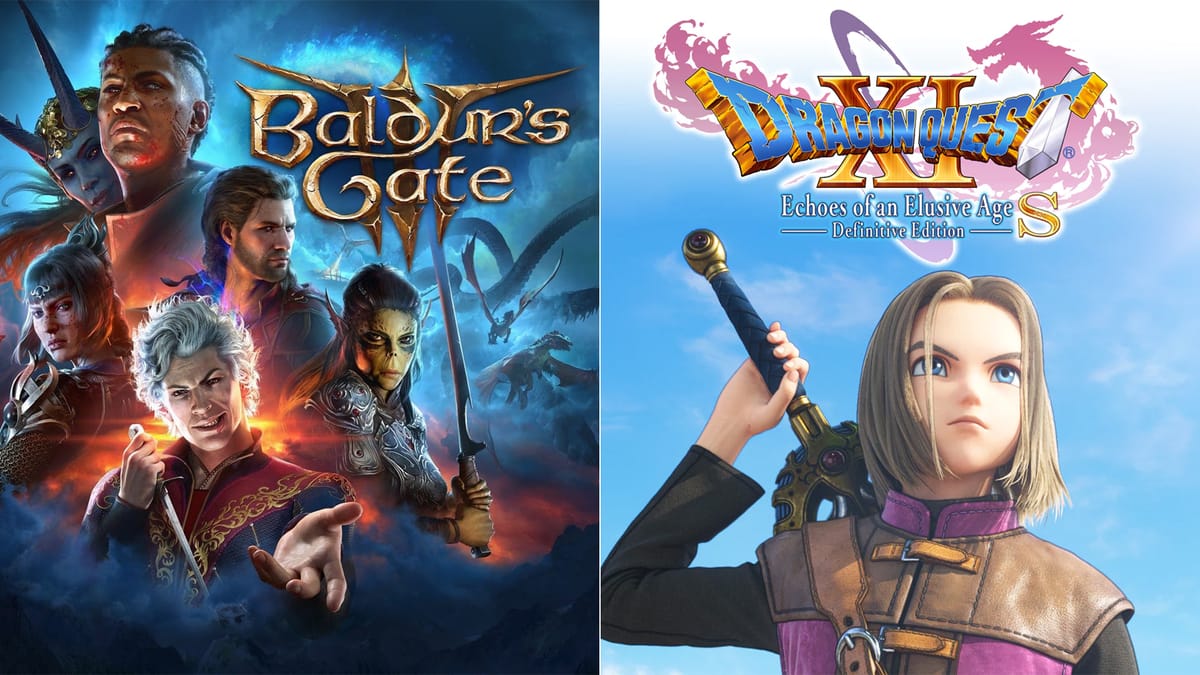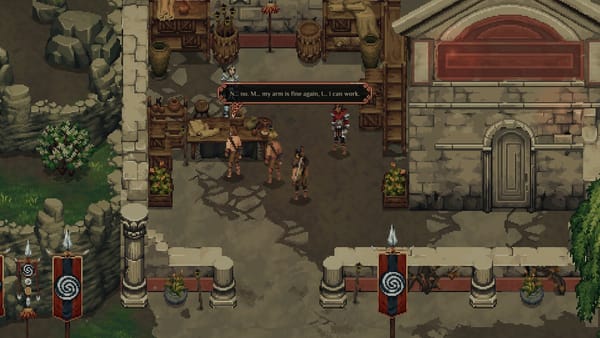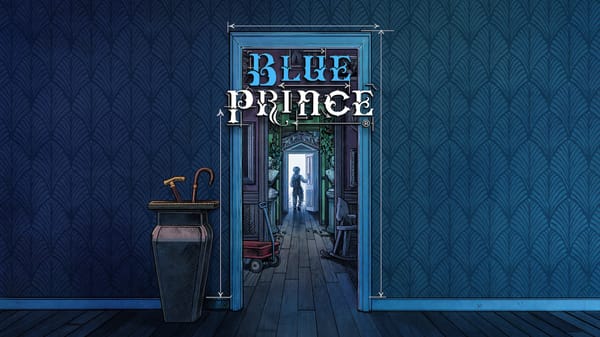Big-Ass RPG Month Part 2: Gameplay
The one where I probably ruffle some feathers

I have a reputation in my D&D group for killing my own characters. A lot. I don’t know how this became such a thing, but I have next to zero regrets when one of my PCs dies off. In fact, I kind of love it. It’s part of what I think D&D does so well, especially in comparison to videogames, where it can often feel like the entire party has plot armor. Strangely or not, I wear it as a badge of honor that, when Backlog contributor and GM extraordinaire Nicole Benivegna put together a set of stats to commemorate our group’s 10 year campaign anniversary, I was number one when it came to character deaths. So as far as D&D goes, it’s safe to say I have a bit of a death wish.
So when I became an inveterate save scummer in Baldur’s Gate 3, I was just as surprised as anyone.
I promised two weeks ago that I would be back here to argue that Dragon Quest XI is more fun to play than Baldur’s Gate 3. And I intend to make good on that promise. But not without some hand-wringing, because, at the end of the day, I am who I am.
Let’s start with a bold proclamation, though: Baldur’s Gate 3’s combat is its weakest element. Because it’s based on D&D, it allows for much more creativity in approach than your garden variety RPG (a category in which I am including DQXI, by the way). You can defeat enemies by turning them into sheep and yeeting them off a cliff just the same as you can overwhelm them with a flurry of arrows just the same as you can poison them and then retreat into the shadows and/or another dimension. It’s wild stuff, and at its best, you feel like you’re playing a terrific D&D campaign. Until, suddenly, you aren’t.
Late-game Baldur’s Gate 3 combat was a drag. Story-wise, I had just as much fun from the opening set piece right up until the last. It was always a joy to navigate a complex narrative with multifaceted characters who have difficult decisions to make about who they are and who they want to be in the end. Every decision you make feels weightier and weightier as the game crescendos to its final revelations. Unfortunately, many of these wonderful narrative moments were coupled with overlong fights that easily could go south after upwards of an hour and a half of fighting, encouraging you to reload or, yes, save scum your way through the fight, since there is no way to fast forward through any of the game’s animations if, God forbid, you have to start it again from the top. In fact, some of the final fights were so overtuned (at least for this College of Valor Bard) that, in what should’ve been some of the game’s finest hours, it felt like a chore to get through them even once.
By contrast, Dragon Quest XI knows its combat can be a chore and gives you the option to automate it, an option I willingly and frequently took.
Dragon Quest XI is as turn-based-RPG as turn-based RPGs get. DQXI tells modernity it can shove it. DQXI is a love letter to 90s RPGs, in that it is a 90s RPG but with 2017 graphics—or not, if you turn on 2D mode. In a world where even the Final Fantasy series has turned into action games with light RPG elements, DQXI says, “You’ll take these antiquated gameplay conventions and you’ll like it.”
And—yeah, I kind of do! I’ll fully admit that there is a strong sense of nostalgia for me when it comes to this kind of RPG combat. I love a little menu and a little magic bar and a little submenu where you forget where, precisely, the move you’re looking for even is. I love equipping one weapon, one armor, and one accessory. I love having to go to a save point to save. Fellow 90s kids will know what I mean, and while perhaps we are wrong to cling to tradition, we cling nonetheless.
But just because something is nostalgic doesn’t mean that it is, by default, more fun. There is no arguing this next point: Dragon Quest XI is a far simpler experience than Baldur’s Gate 3. It is composed in primary colors compared to Baldur’s Gate’s rich tapestry. Anyone who would argue otherwise is being disingenuous. But of the two, it’s my opinion that DQXI is more confidently itself, which to me made it the more enjoyable experience.
To illustrate my point, let me go back to the battle automation thing. You can, in DQXI, set the combat on autopilot and have the game largely play itself. In fact, I played the majority of the game with the entire party set to act automatically except for the player character. Why? Well, to be blunt, to reduce the monotony of playing a turned-based RPG, that’s why. That is, after all, why the option is turned on by default.
By contrast, Baldur’s Gate 3 does not know that it can be monotonous, or if it does, it makes no mechanical concessions to alleviate that monotony. There’s an argument to be made that, if there were simply a way to rewind and/or fast forward battles in BG3, then I wouldn’t be writing any of this. You could read this entire missive as a simple matter of my preference for games not wasting my time, but I genuinely think this is a case of one game understanding its own strengths and weaknesses better than the other.
You know what you’re getting with Dragon Quest XI, and it knows what it’s offering you. You are not getting a complete reimagining of a classic formula. You are getting the formula, classically. Baldur’s Gate 3, for all its depth and wonder as a game, fails to understand that it too can be a bit boring, and that allowing for ways to circumvent that boredom might’ve strengthened the experience as a whole. It is my opinion that the Baldur’s Gate experience as a whole is more adventurous, in scope and in design, than Dragon Quest XI, but it is also my opinion that it is also far, far more oblivious to its own shortcomings.
No piece of art is perfect, but some of the best works understand their own limitations and do everything in their power to obscure or limit those limitations while emphasizing their strengths. Dragon Quest XI does just this. It knows it isn’t breaking the mold when it comes to its chosen genre, so instead it does everything it can to sand off its own worst parts with a bevy of options the player can either engage or disengage. Baldur’s Gate 3 instead says, Here I am. Take me or leave me, every part of me. Good, bad, and in-between—here I am.
So, yes, I had more fun with Dragon Quest XI’s combat than I did with Baldur’s Gate 3. Maybe you think I’m out of my gourd for that one, but here we are. Sometimes, the simpler thing done as well rings truer than the complicated thing that doesn’t always reach its own lofty ambitions. For me, that was the experience of these two games.
And yet, by the same token, I think I’ll remember Baldur’s Gate 3 for longer. It tries new things. It’s riskier. It’s messier. It’s weirder. So while I might not have preferred its gameplay, I’m finding that I hold onto it more as an experience. As a story. As a thing to turn over in my mind rather than a thing to play and enjoy.
That’s why I like games, I think. You can have both. You can have a story that sticks with you, and that’s enough. And you can have gameplay that brings you joy, and that, too, is enough. Both things are meaningful. Both things are worth your time.
Hey, thanks for sticking around for Big-Ass RPG Month. Not sure I’ll be doing it again next year, but we’ll see. Let me know in the comments if this kind of format, where I take a month to talk about two games in concert, was something you’d want to see more of in the future.
For now, wishing a happy Non-Big-Ass RPG Month to one and all. Happy September, folks.




